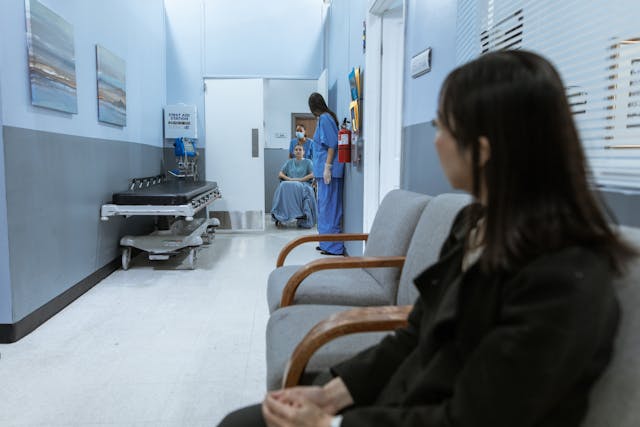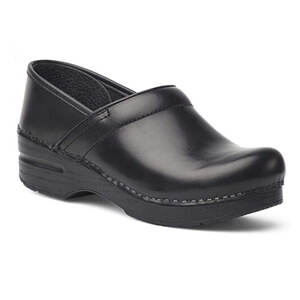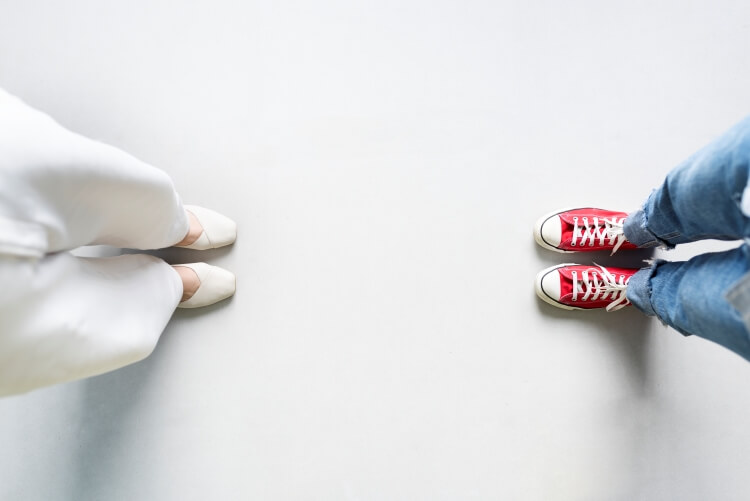Whether you’re been a nurse for several years, or you’re studying to be a nurse, you may be surprised to learn that many wear Crocs. Most of us are familiar with these waterproof types of shoes that we think are made from plastic.

There’s actually more to Crocs, and many reasons why dozens of nurses at your local hospital choose to wear them. Here are just a few reasons why nurses wear Crocs, what type of shoes nurses are allowed to wear, and what to expect when wearing them.
What Are Crocs?
Crocs are a specific brand of shoes made for men or women or children. They’re often called “boat shoes” due to their distinctive shape. They have quite a reputation, and people either love them or hate them. Many people give them a try and change their minds, then never go back to regular shoes again.
This brand was originally designed in Boulder, Colorado, USA back in 2002. Today, there are 120 different style options for men, women, and children, and in various colors and designs. The Crocs brand is sold around the world, as well as in online shops today.
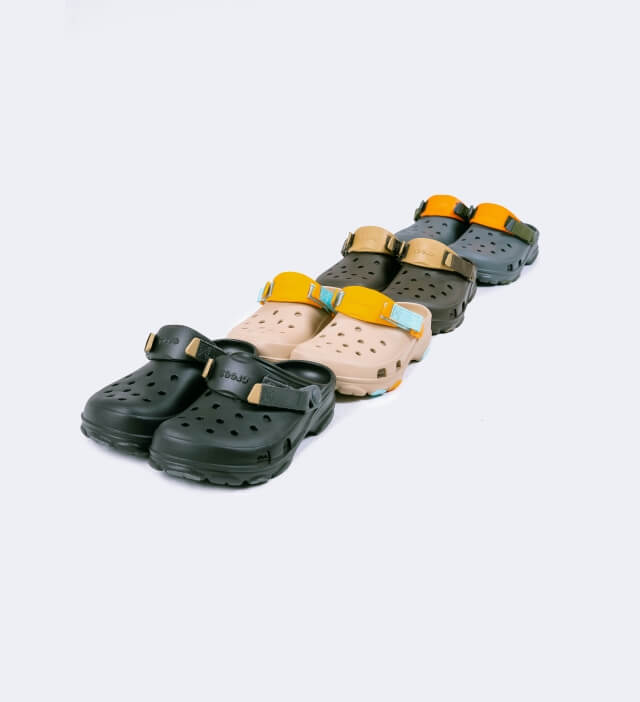
The Crocs brand of shoes is made from a trademarked type of closed-cell resin that they call Croslite. This material cannot be made by any other shoemaker, and most of the formula is a secret anyway. Some have tried to duplicate Crocs, but they just don’t have the same quality.
These shoes are more than plastic, they have been carefully manufactured with many benefits. These shoes have been made to be soft and comfortable, but lightweight. They don’t mark up the floors, and they are odor-resistant. They also don’t have that awful plastic smell that many other plastic shoes too. The Crocs brand has been made to be worn comfortably by everyone.
Comfort and Softness
Nurses have extremely long shifts that can last up to 14 hours, especially in today’s pandemic world. They need shoes that are soft and comfortable and can be worn all day, every day.
Crocs are made from a soft resin material that provides good comfort to their feet. Nurses can add inserts to make them even more comfortable, and that can be replaced easily.
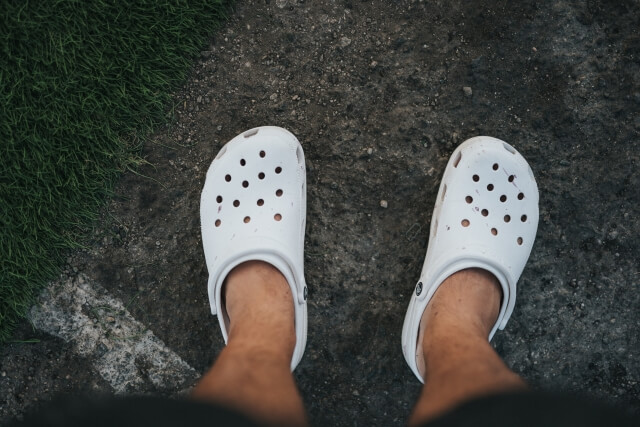
Nurses may have more than one pair of shoes to wear during the day, so they can easily slip into the Crocs at any time. They may also wish to have more than one pair handy in their lockers, just in case they become dirty during the day and there isn’t time to wash them off yet.
Easy to Wash & Sterilize
The nursing profession requires hospital staff to be clean and keep their clothes fresh and clean as well. It’s difficult to wash a pair of runners, and even if they do, they take a long time to dry. Accidents can happen during the day no matter how careful a nurse may be.

It’s also hard to control what a patient may do. Instead of tossing your sneakers or runners into the garbage bin, you can opt to wear Crocs shoes instead.
Crocs are easy to rinse under a water faucet and quick to dry. A spray-on sanitizer can also be used during the cleansing process for extra sanitation. If any accidents happen during the day, the nurse can quickly clean his/her shoes quite easily, or toss them into a plastic bag to be dealt with at a later date.
Safe Slip-Resistant Soles
Crocs are made with slip-resistant soles because the company recognized that people want to feel safe and secure while walking across slippery floors or even outside in the rain or snow.
It’s even more important for a nurse to wear safe shoes with slip-resistant soles to prevent accidents at work. Often there can be bodily fluids or other spills on the floor of the hospital. Staff do their best to be careful, but accidents can happen.
Crocs repel any slippery fluids on the floor so that when you walk on them, you can feel safe and secure. You’ll still want to mop up that spill quickly and rinse off the bottoms of your Crocs though.
Available in a Wide Range of Colors
Crocs are available in a wide range of colors. Most nurses are probably required to wear white footwear, but there are other colors to match scrubs too, such as light green, light blue, and light gold.
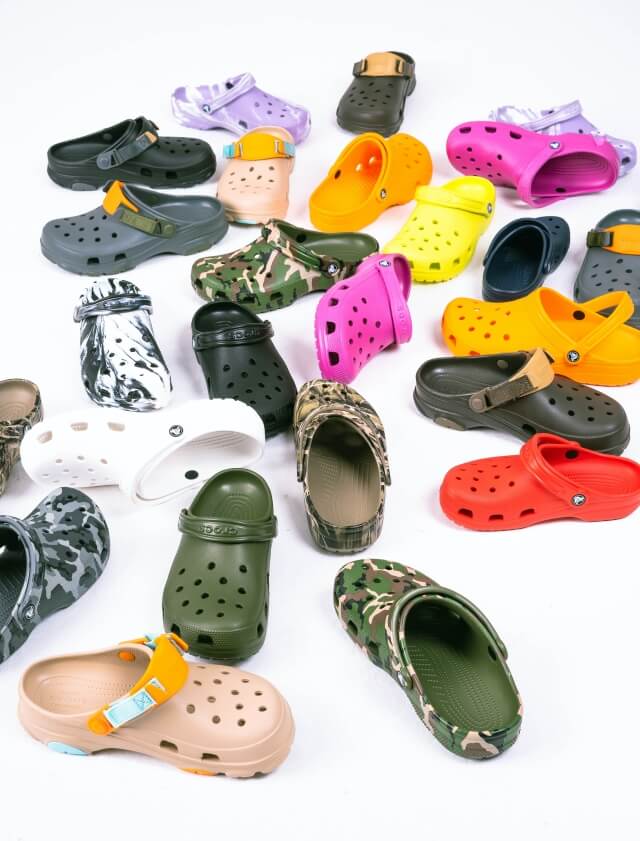
Nurses in other medical professions, such as a veterinary clinic or physiotherapy clinic may be able to wear shoe colors that match their uniforms.
Again, it’s best to read your employee manual to find out what you can and cannot wear. If you can wear the lighter colors, it will put a smile on your face. Other colors will more easily hide the dirt too, until you can get your Crocs washed in the sink at the end of your shift.
They Don’t Mark Up Floors
No matter what type of Crocs you wear, they do not place black or colored marks on the floors like many other types of dark-soled sneakers and runners. Many types of footwear have been banned by employers over the years for this reason.
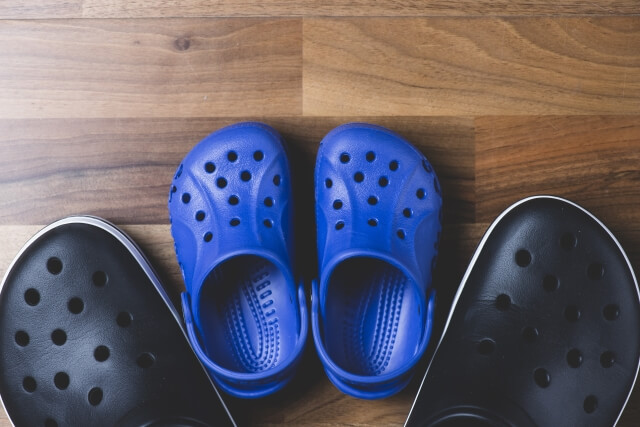
Trying to remove dark marks from the flooring has been frustrating for janitors. Employers started banning employees from wearing certain types of shoes due to these issues. Plus, it didn’t look good for the clinic or hospital to appear to have filthy flooring!
They Provide Quiet Comfort
If you work in a clinic or hospital, it’s important to keep noise levels at a minimum. There may be many stressed-out people in the ER or hospital rooms.
The quieter you can be when walking down a hall or across an emergency room floor, the happier your patients will be. Crocs are made from soft materials that minimize noise as you walk across the room.
No Stinky Plastic Smell
While plastic smells don’t bother everyone, you don’t want to be smelling them all day long. Wearing Crocs is the best solution, as they are free from bad plastic smells. And many patients are sensitive to scents, so smelling plastic isn’t going to help them either.
And you can be assured that the resin that Crocs are made from is toxin-free, so not only are nurses protected while wearing them, there will be no toxins emanating from them that can harm the patients either.
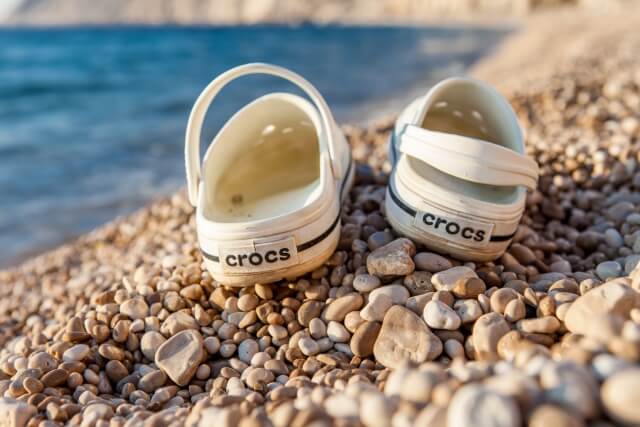
Their Odor-Controlling Properties
Crocs don’t emit any odors, but you may be concerned about how your shoes smell after several hours of work. You do your best to wear moisture-wicking socks but you are still concerned with bad odors.
The good news is that the Crocs line of shoes helps to repel odors. You may have to change your socks during the day, but bad foot odor will not stick to your Croc shoes at all.
Crocs Are Simple
When you’re a nurse, you need simplicity in your life. You don’t want shoes that are going to take five minutes to get on or off. You need shoes that slip on easily, and that slip off easily as required.
Your shoes should work well with the comfortable moisture-wicking socks you love. These shoes also look simple, so your eyes don’t get tired when looking at them.
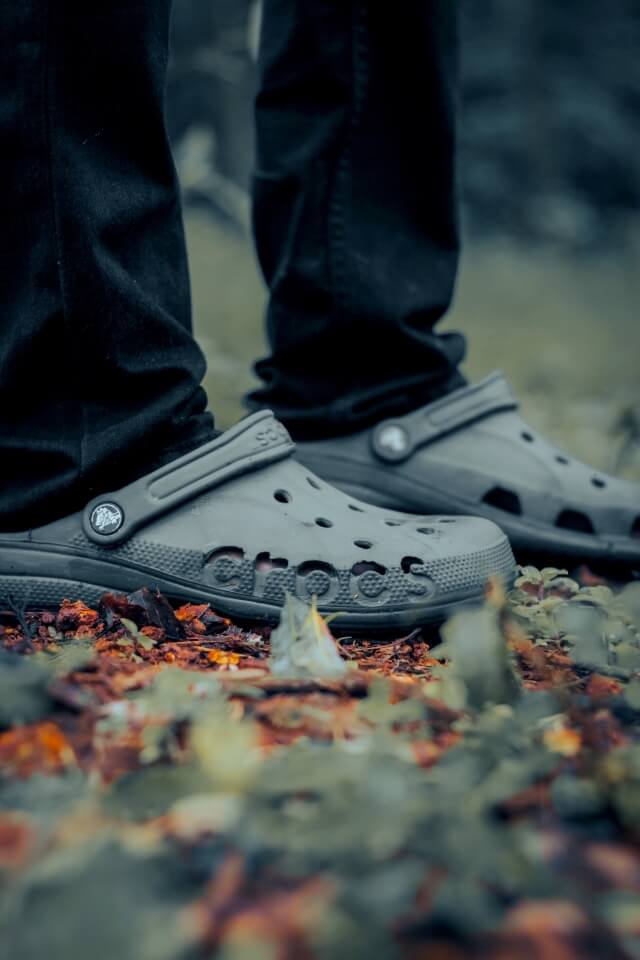
Crocs Are Fun
In some medical environments, nursing staff can wear fun scrubs. These can make the patients and your coworkers smile. Crocs are also designed to be fun. Their color and clever design will make you smile and relax when you put them on. And your patients and coworkers may even notice too.
You may think that something as simple as a small item of clothing won’t matter, but when a patient is in the hospital, it’s the small simple things they see that can help them to relax and feel more comfortable.
They Protect the Feet
Besides the Crocs protecting the feet from human bodily fluids and sharp objects, the fully-covered shoes also protect the toes from harm. If you accidentally hit your foot against an item of furniture, your toes should be protected.
Or, if you drop an item on your foot by accident, the shoes should be thick enough to prevent injuries. The Crocs can do that just as well as any pair of runners or sneakers that nurses may wear too.
The Crocs Are Durable
When you work in a hospital you need your shoes to last at least a year. You can’t afford to be replacing them every few months. You need a durable shoe that will stand up to long working days, and also be durable enough should you accidentally drop a cup on them.
The Crocs brand has been made to be strong and durable, and not only last through normal daily wear but for longer working activity too.
What Types of Crocs Should Nurses Wear?
There are several different types of Crocs that medical staff can wear. Some are more appropriate to wear in a clinic or hospital than others. A nurse should consult with her employer first, to see what is allowed.
They should not order the Crocs with all the holes in them, as sharp objects could be dropped and might injure their feet. There may also be the concern that bodily fluids may drop and land on your feet, especially if there are holes in the shoes.

It’s also recommended to not wear the type with the straps in the back. This is because there is not enough support for the feet. The best type of Crocs to wear is the type that looks more like runners. If you’re surprised that these may be available for sale today, they are, as the Crocs brand now recognizes the need for every type of shoe to be available to their market.
Footwear for nurses and medical staff should provide some protection to your skin, but if accidents happen, the shoes should be simple to clean and quick to dry off.
Crocs can be more than stylish shoes to wear on your days off. There are specific types of Crocs that have been designed to support the feet and to be worn by nurses. If you haven’t tried a set of Crocs before now, they may be the perfect solution for what to wear at the clinic or hospital where you work at.
We still advise that you keep a spare pair of footwear available in your locker though, just in case! But you’ll be pleasantly surprised that there is a much simpler solution to your working footwear that is both attractive and comfortable to wear!
Frequently Asked Questions
Why do many nurses choose to wear Crocs?
Many nurses opt to wear Crocs for several reasons. Firstly, Crocs are known for their exceptional comfort and cushioning, which is crucial for professionals who spend long hours on their feet. The soft and supportive material of Crocs can help alleviate foot and leg fatigue, reducing the risk of discomfort and pain during demanding shifts. Additionally, Crocs are easy to clean and have slip-resistant soles, making them suitable for the often fast-paced and unpredictable healthcare environment. Their lightweight design and roomy fit allow for ample airflow, preventing excessive sweating and promoting overall foot hygiene. Overall, Crocs have gained popularity among nurses due to their combination of comfort, practicality, and functionality.
Are Crocs considered appropriate and professional footwear for nurses?
While opinions may vary, Crocs have become widely accepted as appropriate and professional footwear in the nursing community. The evolution of Crocs designs now offers a range of styles specifically tailored for healthcare professionals. These specialized Crocs feature closed toes, enhanced arch support, and easy-to-clean materials, making them suitable for the clinical setting. Additionally, hospitals and healthcare institutions often have guidelines regarding appropriate footwear, and many now acknowledge Crocs as a valid option for nurses. Ultimately, the appropriateness of Crocs as professional footwear may depend on individual workplace policies and personal preferences.
Can wearing Crocs improve workplace safety for nurses?
Yes, wearing Crocs can contribute to improved workplace safety for nurses. Crocs are designed with slip-resistant soles, providing better traction on various surfaces. This feature can help reduce the risk of slipping and falling, especially in environments where liquids and spills are common. The ability to quickly clean Crocs is another safety benefit, as it helps prevent the spread of contaminants and minimizes the risk of cross-contamination. Furthermore, the lightweight nature of Crocs allows for quick movement, which can be crucial in emergency situations. By providing both comfort and safety features, Crocs have become a preferred choice for many nurses.
Do Crocs offer any specific benefits for nurses with foot conditions?
Yes, Crocs can offer specific benefits for nurses with foot conditions. Nurses who suffer from conditions such as plantar fasciitis, flat feet, or heel spurs often experience foot pain and discomfort. Crocs with enhanced arch support and cushioning can help alleviate some of these symptoms by providing additional comfort and stability. The roomy design of Crocs also accommodates orthotic inserts, allowing nurses to customize their footwear for optimal support. However, it is important for nurses with specific foot conditions to consult with healthcare professionals or podiatrists to ensure the suitability of Crocs or other footwear options for their individual needs.
Remember, while Crocs have gained popularity among nurses for their comfort and practicality, it is essential to consider workplace guidelines and personal preferences when choosing appropriate footwear for nursing practice.
You may also like
Nursing Specializations: Choosing Your Path in the Diverse Field of Nursing
Nursing Specializations Nursing includes many specializations, each addressing specific healthcare needs. These roles allow nurses…
Dansko Women’s Professional Pro Cabrio Leather Clog Review
Dansko enjoys an excellent reputation all over the world, thanks to its high quality shoes….
Are Shoes with Pointed Toes Bad for You?
If you’re a nurse who’s on your feet for long shifts every day, you need…
Does nursing have math?
In this article, we’re diving into a common question that often arises among aspiring and…
5 Tips for Succeeding in Nursing School
Today more than ever, the world needs nurses. However, nursing is a difficult profession and…
The Best of Dansko Nursing Shoes
The Dansko Nursing Shoes aims to provide the best quality nursing shoes, doctor clogs, nursing…
